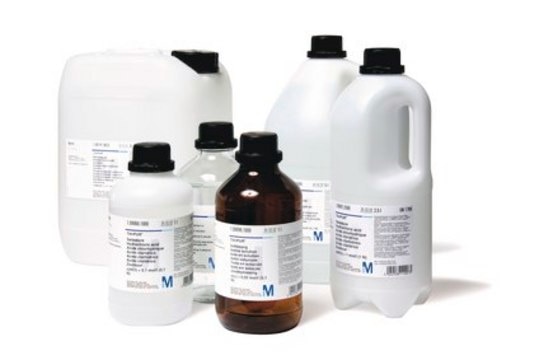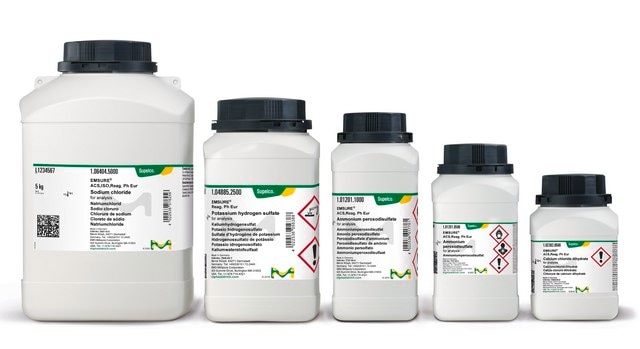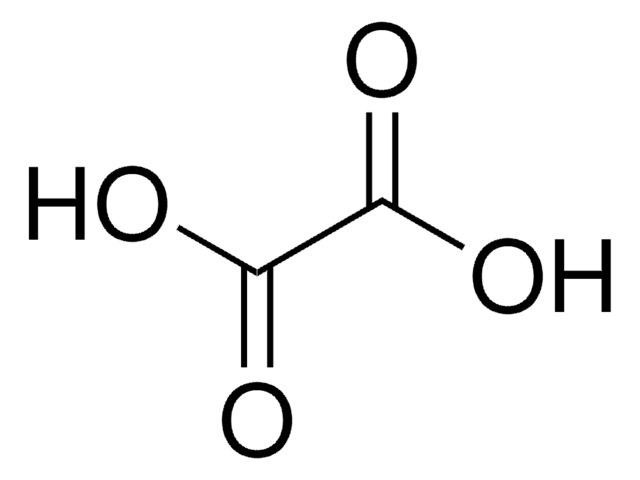4.80160
Potassium permanganate solution
c(KMnO4) = 0.05 mol/l (0.25 N), Titripur®
Sign Into View Organizational & Contract Pricing
All Photos(1)
About This Item
UNSPSC Code:
12352312
Recommended Products
Quality Level
product line
Titripur®
form
liquid
quality
Analyzed in our ISO 17025 accredited QC lab
reaction suitability
reaction type: Redox Reactions
concentration
0.05 M
technique(s)
titration: suitable
pH
7 ( in H2O)
density
1.0035 g/cm3
storage temp.
15-25°C
Related Categories
Application
- Rediscover Potassium Permanganate as a Stain for Basic Proteins on Ultrathin Sections at Transmission Electron Microscopy.: This study explores the reapplication of potassium permanganate as a staining agent for basic proteins in transmission electron microscopy, demonstrating its effectiveness in enhancing protein visualization (Zannino et al., 2023).
- Core-satellite surface imprinting polymer-based pipette tip solid-phase extraction for the colorimetric determination of pyrethroid metabolite.: This study presents a novel method using potassium permanganate in core-satellite surface imprinting for efficient extraction and colorimetric analysis of pyrethroid metabolites in environmental samples (Ye et al., 2020).
Features and Benefits
Accreditation:
This volumetric solution is analyzed by our calibration laboratory D-K-15185-01-00 which is accredited according to DIN EN ISO/IEC 17025 for analysis of amount-of-substance concentrations in volumetric solutions by DAkkS (Deutsche Akkreditierungsstelle - German National Accreditation Body). The accreditation certificate can be found at www.sigmaaldrich.com/ISO17025.
This volumetric solution is analyzed by our calibration laboratory D-K-15185-01-00 which is accredited according to DIN EN ISO/IEC 17025 for analysis of amount-of-substance concentrations in volumetric solutions by DAkkS (Deutsche Akkreditierungsstelle - German National Accreditation Body). The accreditation certificate can be found at www.sigmaaldrich.com/ISO17025.
Packaging
SKU-pack size numbers ending with a "3" are SmartChemicals with an RFID tag on the label for seamless data transfer to the instrument, e.g. xxxxxx1003 or xxxxxxx 4003. More information on www.sigmaaldrich.com/SmartChemicals
Analysis Note
Form liquid
Amount-of-substance concentration 0.04975 - 0.05025 mol/L
Measurement uncertainty ± 0.00015 mol/L
Traceability NIST SRM
The concentration is determined by volumetric titration and refers to 20°C.
The amount-of-substance concentration of this volumetric solution is traceable to a primary standard reference material (SRM) from the National Institute of Standards and Technology, Gaithersburg, USA (NIST SRM 8040 di-sodium oxalate) by means of volumetric standard di-sodium oxalate (article number 1.02407), certified reference material according to ISO 17034, analyzed by our accredited calibration laboratory of Merck KGaA, Darmstadt, Germany according to DIN EN ISO/IEC 17025. The uncertainty is expressed as expanded measurement uncertainty with a coverage factor k=2 covering a confidence level of 95%.
Note: The titer is a correction factor to correct for variations of the volumetric solution, the titration equipment, the temperature and other laboratory conditions. For correct titration results it is recommended to determine a titer with the laboratory specific equipment and under laboratory specific conditions directly after opening a new bottle and at regular time intervals.
Amount-of-substance concentration 0.04975 - 0.05025 mol/L
Measurement uncertainty ± 0.00015 mol/L
Traceability NIST SRM
The concentration is determined by volumetric titration and refers to 20°C.
The amount-of-substance concentration of this volumetric solution is traceable to a primary standard reference material (SRM) from the National Institute of Standards and Technology, Gaithersburg, USA (NIST SRM 8040 di-sodium oxalate) by means of volumetric standard di-sodium oxalate (article number 1.02407), certified reference material according to ISO 17034, analyzed by our accredited calibration laboratory of Merck KGaA, Darmstadt, Germany according to DIN EN ISO/IEC 17025. The uncertainty is expressed as expanded measurement uncertainty with a coverage factor k=2 covering a confidence level of 95%.
Note: The titer is a correction factor to correct for variations of the volumetric solution, the titration equipment, the temperature and other laboratory conditions. For correct titration results it is recommended to determine a titer with the laboratory specific equipment and under laboratory specific conditions directly after opening a new bottle and at regular time intervals.
Legal Information
Titripur is a registered trademark of Merck KGaA, Darmstadt, Germany
hcodes
pcodes
Hazard Classifications
Aquatic Chronic 2
Storage Class
12 - Non Combustible Liquids
wgk_germany
WGK 3
flash_point_f
Not applicable
flash_point_c
Not applicable
Certificates of Analysis (COA)
Search for Certificates of Analysis (COA) by entering the products Lot/Batch Number. Lot and Batch Numbers can be found on a product’s label following the words ‘Lot’ or ‘Batch’.
Already Own This Product?
Find documentation for the products that you have recently purchased in the Document Library.
Customers Also Viewed
Our team of scientists has experience in all areas of research including Life Science, Material Science, Chemical Synthesis, Chromatography, Analytical and many others.
Contact Technical Service





